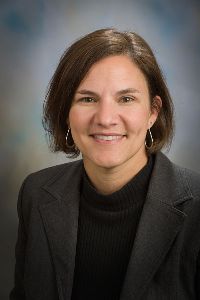Oct 25 2013
Researchers in the Colorado State University School of Biomedical Engineering are developing a material that can help injured knees regenerate soft tissue after reconstructive surgery.
 Tammy Haut Donahue, Associate Professor of Mechanical Engineering, Colorado State University
Tammy Haut Donahue, Associate Professor of Mechanical Engineering, Colorado State University
Principal Investigator Tammy Haut Donahue and Co-Investigator Ketul Popat, associate professors in the Mechanical Engineering department at CSU, are part of a three-year, $1.2 million grant in conjunction with collaborators in Ireland and Northern Ireland. Donahue and Popat are working with experts from the Trinity College Centre for Bioengineering and Queens University to address a growing problem related to knee injuries, specifically focusing on the soft-tissue-to-bone interface.
Knee injuries account for more than 25 percent of all orthopedic treatments in the U.S., and more than half of all sports injuries. One of the most common knee injuries is a torn anterior cruciate ligament (ACL), which is typically repaired surgically using tissue grafts. However, ACL repair results in a high rate of repeat surgeries, due to the lack of regrowth of soft tissue in the knee.
“Although numerous replacements for injured soft tissue structures have been developed, they typically fail to address the soft-tissue-to-bone interface,” Popat explained. “This interface is necessary for the proper function of the entire joint.”
The CSU team is creating a new biomaterial that will be able to mimic that natural interface. The material, a hydrogel reinforced with nanofibers, will be seeded with stem cells naturally occurring in adult cartilage. The replacement tissue made from the hydrogel will be physically and biochemically modified to drive the implanted stem cells into the hard bone of the knee. There it will promote the formation of an intermediary soft tissue template that will grow into appropriate end-stage soft tissue.
“The strategy is to recapitulate different aspects of the development process, where all tissues are derived from soft tissue precursors and specific environmental cues,” Donahue said. “This approach is innovative in providing engineered tissue grafts with the capacity to promote the formation of a gradient from soft to hard tissue.”
The interdisciplinary project incorporates materials research, engineering, cell biology, and biomaterials. Much of the research at CSU will be conducted in the recently remodeled Orthopaedic Research Center Bioengineering Lab.
Colorado State will receive $400,000 from the National Science Foundation to support this project; the Science Foundation of Ireland and Invest Northern Ireland-Department of Employment and Learning are contributing the remaining funds.
Results of the research are expected to be published starting in 2014.